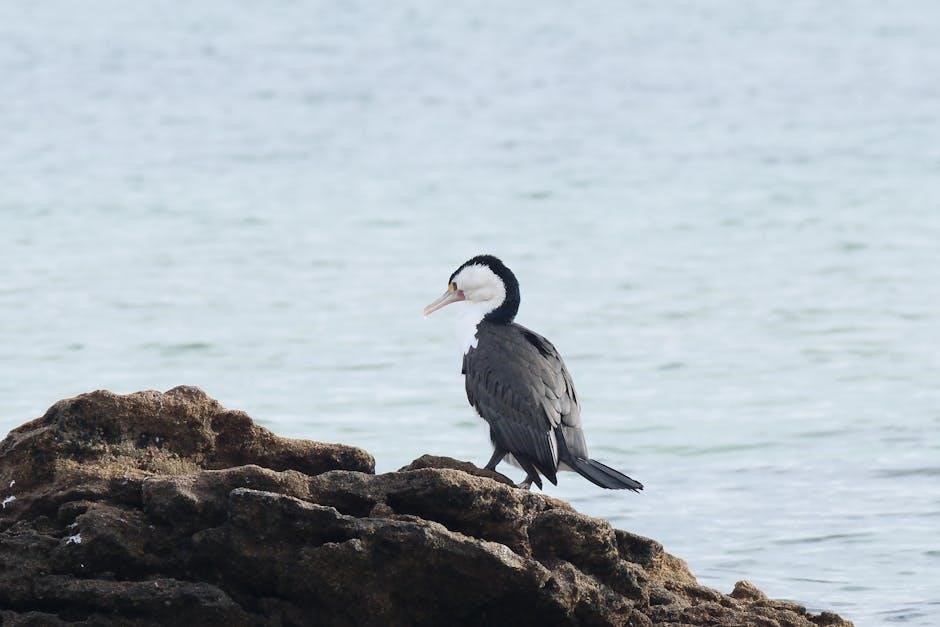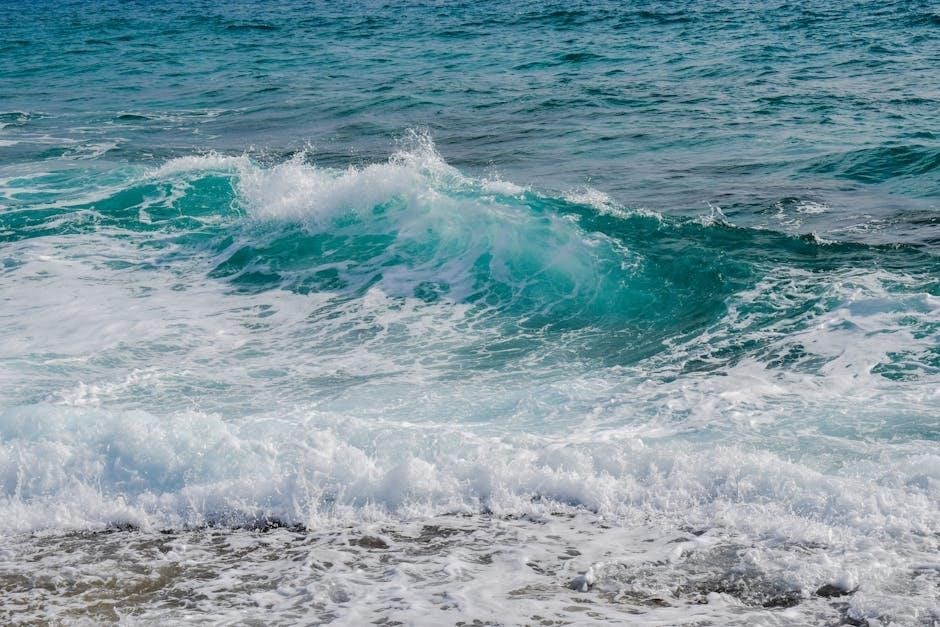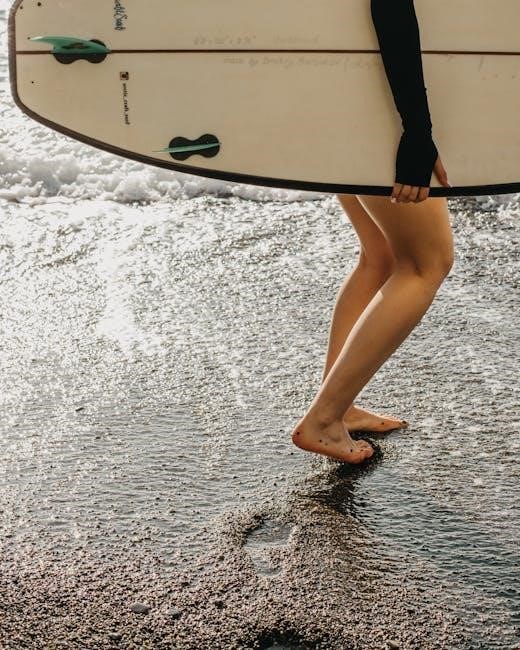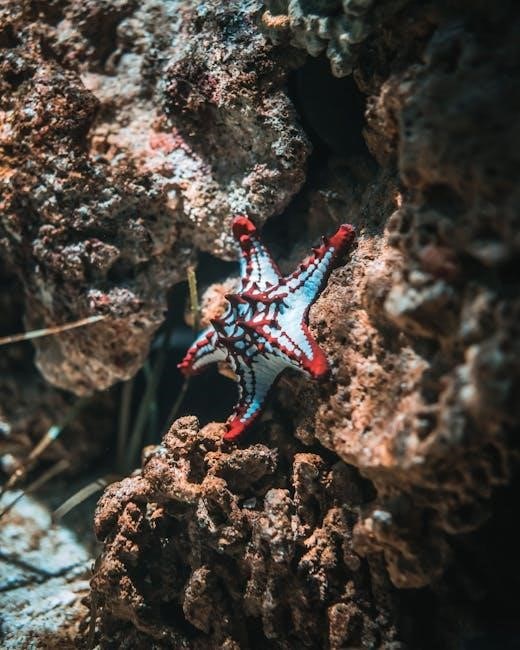The 2024 NJ Saltwater Regulations provide essential guidelines for anglers‚ ensuring sustainable fishing practices and healthy marine ecosystems. Download the official PDF for detailed updates‚ including licensing requirements‚ species-specific limits‚ and gear restrictions. Stay informed to comply with the latest rules and contribute to conservation efforts.
Overview of the 2024 Updates
The 2024 NJ Saltwater Regulations introduce key updates to ensure sustainable fishing practices. Changes include revised bag limits for species like black sea bass and scup‚ circle hook requirements for certain catches‚ and adjustments to gear restrictions. Licensing requirements remain a priority‚ with the New Jersey Saltwater Recreational Registry Program still mandatory for anglers. These updates aim to balance recreational and commercial fishing interests while promoting conservation and healthy fish populations. Stay informed by reviewing the official 2024 PDF guide for detailed information.
Importance of Adhering to Regulations
Adhering to the 2024 NJ Saltwater Regulations is crucial for maintaining healthy marine ecosystems and ensuring sustainable fishing practices. Compliance helps protect fish populations‚ supports biodiversity‚ and guarantees long-term access to fishing resources. By following size limits‚ bag restrictions‚ and gear rules‚ anglers contribute to conservation efforts. Non-compliance can lead to penalties and harm fish stocks‚ emphasizing the importance of understanding and respecting these guidelines. Responsible fishing practices benefit both current and future generations of anglers.
Licensing Requirements
Obtaining proper licenses is mandatory for saltwater fishing in New Jersey. The Saltwater Recreational Registry Program requires registration‚ ensuring compliance with state and federal regulations. Register before fishing to avoid penalties and support conservation efforts;
New Jersey Saltwater Recreational Registry Program
Registration in the New Jersey Saltwater Recreational Registry Program is mandatory for all saltwater anglers. This free and easy process ensures compliance with state and federal regulations. The program helps track fishing efforts and supports conservation initiatives. Anglers must register before fishing‚ regardless of residency‚ to avoid penalties. This requirement applies to all recreational fishing activities in New Jersey waters. Visit SaltwaterRegistry.nj.gov to complete your registration and stay compliant with the latest regulations.
Types of Licenses and Permits
The New Jersey Saltwater Recreational Registry Program is required for all anglers. Residents and non-residents must register annually‚ with no fee for state residents. Additional permits may be needed for specific species‚ such as striped bass‚ under the Striped Bass Bonus Program. Licenses and permits ensure compliance with conservation goals and provide access to state and federal waters. Visit the NJDEP website or local tackle shops for detailed requirements and to obtain necessary documentation before your fishing trip.

Species-Specific Regulations
2024 NJ Saltwater Regulations include species-specific size‚ bag limits‚ and seasonal restrictions to ensure sustainable fishing practices. Anglers must consult the official guide for detailed species rules.
Striped Bass and Hybrid Striped Bass Limits
For 2024‚ the Striped Bass and Hybrid Striped Bass limit is set at 1 fish per angler‚ with a size range of 28 to 31 inches. Anglers must adhere to these restrictions to ensure sustainable populations and comply with conservation efforts. The Striped Bass Bonus Program offers additional opportunities under specific conditions‚ as detailed in the Marine Digest. Circle hook requirements and gaff prohibitions are also in place to reduce bycatch and promote responsible fishing practices. These regulations apply to both state and federal waters.
Black Sea Bass and Scup Regulations
Black Sea Bass regulations for 2024 include a 10-fish bag limit per person‚ with a minimum size of 12.5 inches. The season runs from May 17 to June 19. Scup regulations feature a reduced bag limit of 30 fish‚ with a 10-inch minimum size. The season is split into two periods: January 1 to June 30 and October 1 to December 31. These adjustments aim to balance recreational and commercial fishing needs while promoting sustainable fish populations. Anglers are encouraged to verify the latest updates before each trip.
Tautog (Blackfish) and Porgy/Scup Rules
Tautog (Blackfish) regulations in 2024 include a bag limit of two fish per day‚ with a minimum size of 16 inches. The season is open from April 1 to January 31‚ allowing catch and release only during closed periods. Porgy/Scup rules feature a 30-fish bag limit with a 10-inch minimum size‚ split into two seasons: January 1 to June 30 and October 1 to December 31. These measures ensure sustainable harvests while maintaining diverse fishing opportunities for anglers in New Jersey waters.
Bag Limits and Possession Restrictions
The 2024 NJ Saltwater Regulations establish specific bag limits and possession restrictions to ensure sustainable fishing practices. Limits vary by species‚ size requirements‚ and seasonal adjustments. Anglers must adhere to these rules to maintain healthy fish populations and comply with conservation efforts; Always consult the official guide for the most accurate and up-to-date information before heading out to fish.
Seasonal Variations in Bag Limits
The bag limits for various saltwater species in New Jersey vary throughout the year to align with ecological cycles and conservation goals. For example‚ the black sea bass season runs from May 17 to June 19‚ with a 10-per-person bag limit and a minimum size of 12.5 inches. Similarly‚ porgy/scup have a 30-fish bag limit from January 1 to June 30‚ with a 10-inch minimum size. These seasonal adjustments ensure sustainable fishing practices while providing opportunities for anglers to enjoy their sport responsibly.
Size Limits for Key Species
The 2024 NJ Saltwater Regulations specify minimum size limits for key species to ensure sustainable fishing practices. Striped bass must be between 28 and 31 inches to be retained‚ with a limit of one fish per angler. Black sea bass have a 12.5-inch minimum size‚ while tautog (blackfish) require a 16-inch minimum. These size limits help protect juvenile fish and maintain balanced fish populations. Adhering to these rules is crucial for the long-term health of New Jersey’s marine ecosystems and the stability of recreational fishing opportunities.

Gear Restrictions
Gear restrictions in 2024 include circle hook requirements for certain species and a prohibition on gaffs to reduce bycatch and promote sustainable fishing practices in New Jersey waters.
Circle Hook Requirements
In 2024‚ New Jersey mandates the use of circle hooks for certain species to minimize bycatch and reduce fish mortality. These hooks are designed to catch fish by the mouth rather than ingest‚ aiding in safer releases and promoting sustainable fishing practices. Compliance with this regulation is crucial for anglers targeting specific species‚ ensuring the conservation of marine resources while maintaining healthy fish populations for future generations. Proper gear adherence supports environmental balance and responsible angling.
Gaff Prohibition and Other Gear Rules
Gaffs are prohibited for certain species in New Jersey’s 2024 saltwater regulations to reduce internal injuries and aid in safe releases. This rule applies particularly to striped bass‚ promoting conservation efforts. Additionally‚ specific gear restrictions are in place to protect marine habitats and ensure sustainable fishing practices. Anglers must adhere to these rules to avoid penalties and support environmental preservation. Proper gear selection and handling techniques are essential for compliance and responsible angling in New Jersey’s coastal waters.
Fishing Seasons and Closures
2024 regulations outline seasonal openings and closures for species like Black Sea Bass and Tautog‚ ensuring sustainable fishing practices and protecting critical habitats during spawning periods.
Seasonal Openings and Closures
The 2024 NJ Saltwater Regulations detail specific seasonal openings and closures for various species to ensure sustainable fishing. Black Sea Bass season runs from May 17 to June 19‚ with a 12.5-inch minimum size and 10 per person bag limit. Scup season is open from January 1 to June 30‚ with a 10-inch minimum size and 30 fish bag limit. Tautog (blackfish) season operates from April 1 to January 31‚ with a bag limit of two fish‚ while catch and release is allowed during closed periods. These timelines help protect spawning periods and maintain healthy fish populations.
Closed Seasons and Protected Areas
Closed seasons and protected areas are critical for conservation. Certain marine areas are closed year-round to protect critical habitats and spawning grounds. Striped Bass‚ for example‚ have closed seasons to safeguard spawning populations. Protected areas like artificial reefs and marine reserves are off-limits to fishing to preserve biodiversity. Adhering to these closures ensures the sustainability of New Jersey’s marine ecosystems and supports the recovery of fish populations. Anglers must familiarize themselves with these restrictions to avoid violating regulations.
Environmental Considerations
Sustainability and conservation are key priorities in the 2024 NJ Saltwater Regulations. Protecting marine life‚ habitats‚ and ecosystems ensures a balanced environment for future generations. Adherence to these guidelines promotes biodiversity and addresses climate impacts on fish populations. By fostering responsible fishing practices‚ anglers play a vital role in preserving New Jersey’s coastal ecosystems and natural resources.
Sustainability and Conservation Efforts
The 2024 NJ Saltwater Regulations emphasize sustainability and conservation to protect marine ecosystems. Measures include catch limits‚ size restrictions‚ and gear rules to minimize environmental impact. These efforts aim to rebuild fish populations‚ ensure biodiversity‚ and maintain ecosystem balance. By adhering to these guidelines‚ anglers contribute to the long-term health of New Jersey’s coastal waters‚ supporting both recreational and commercial fishing industries while preserving natural resources for future generations.
Impact of Regulations on Fish Populations
The 2024 NJ Saltwater Regulations directly influence fish populations by setting science-based limits and seasonal closures. These measures help reduce overfishing‚ allowing species like striped bass and black sea bass to rebound. Conservation efforts also protect critical habitats‚ ensuring the recovery of depleted stocks. By balancing recreational and commercial interests‚ the regulations foster a sustainable ecosystem‚ benefiting both marine life and the fishing community.

Enforcement and Penalties
Enforcement of 2024 NJ Saltwater Regulations ensures compliance through monitoring and inspections. Penalties for violations include fines and potential license suspensions‚ promoting adherence to conservation goals.
Monitoring and Enforcement Measures
Monitoring and enforcement of 2024 NJ Saltwater Regulations are carried out by state authorities to ensure compliance. Inspections of catches‚ gear‚ and licenses are conducted regularly. The New Jersey Saltwater Recreational Registry Program tracks angler activity‚ aiding in conservation efforts. Electronic reporting systems and on-water patrols enhance monitoring efficiency. Non-compliance results in penalties‚ fostering adherence to rules and protecting marine resources. These measures are critical for maintaining sustainable fish populations and ensuring fair access for all anglers.
Consequences of Non-Compliance
Non-compliance with 2024 NJ Saltwater Regulations can result in fines‚ penalties‚ and legal action. Violations‚ such as exceeding bag limits or using prohibited gear‚ may lead to confiscation of catch and equipment. Repeat offenses can escalate penalties‚ potentially affecting future fishing privileges. Ignoring regulations undermines conservation efforts‚ harming fish populations and ecosystems. Authorities enforce these rules to ensure sustainability and fairness‚ making compliance essential for all anglers. Failure to adhere to the rules jeopardizes both individual privileges and the state’s marine resources.

Accessing the 2024 PDF Guide
Access the official 2024 NJ Saltwater Regulations PDF guide via the NJ Department of Environmental Protection’s website. Ensure compliance by downloading the latest updates and registering for free.
Downloading the Official Regulations
The official 2024 NJ Saltwater Regulations guide is available for download as a PDF from the NJ Department of Environmental Protection’s website. This comprehensive document outlines size and bag limits‚ species-specific rules‚ and seasonal changes. Anglers can access the guide for free‚ ensuring they stay compliant with all fishing regulations in New Jersey. The PDF serves as a vital resource for both recreational and commercial fishing activities‚ covering state and federal waters. Download and review it before your next fishing trip to ensure adherence to the latest updates and requirements.
Additional Resources and References
For further details‚ the NJ Department of Environmental Protection provides comprehensive resources. Visit eRegulations.com for species-specific limits and updates. The official 2024 NJ Saltwater Fishing Regulations PDF is also available for download‚ offering in-depth information on licensing‚ gear restrictions‚ and seasonal closures. These resources ensure anglers stay informed and compliant with the latest regulations.

Leave a Reply
You must be logged in to post a comment.